初中英语中的几种否定
初中英语中遇到的部分否定

全 ……” 。例 如 :
我 国最著名的热水潮爰哪一个?( 西藏羊八井 )
5 5
… 妻匿 鳕 模语 |
We e o tgte tf d 我们 并不 完全 满意 。 ln tl ehr asi . ft ao si e
藕 莲 的什 么? ( ) 是 篓
56
es r. )
并 非所有 的人 都 能 当教 师 。
No l t h l r n lk h ta l hec id e i et eTV l y rn e sPe r. p a sP i c s a 1
并 非所有 的孩 子都喜 欢 还珠格 格 。
2 bt . oh的否定 式 :n t oh( b t …n t 并 非两 个 ……都 o…b t 或 oh o) ,“
T e o ’a re o lt y 们 并不完 全 同意。 h yd n t ge mpee . c l他
Wh t h i wa o ut po e. 做 的 不 完 全 妥 当 。 a se d s t i rp r d n q e  ̄
6 ltei . lh t a 、 me的否 定式 : 并非 一直 ……” 未必老 是 ……” 例 如 : “ “ 。
蒯秽 I 鼯 逝
初 中 英 语 中
遇 到 的 部 分 否 定
安徽 李 成 民
很 多考 生对 英语 中 的一 些否 定表达 的意 思不 太理解 , 不清 到底 弄 是 全部 否定 还是部 分否 定 , 如此 的话 , 会对 短文 的理解 不准 确 , 成 就 造
初中英语不完全否定的六种表达方法

初中英语不完全否定的六种表达方法1、all 的否定式:not all…(或:all…not)表示“并非都……”、“不是所有的都……”eg:Not all students can study English well. (= All students cannot study English well.) 并非每一个学生都能学好英语。
2、both 的否定式:not…both (或:both… not) “并非两个……都…… ”eg. I don't want both the tickits to the Sound of Music.我不是两张《音乐之声》的票都要。
Both (the) books are not mine. 两本书并不都是我的。
3、not…and…的否定式,被否定的往往是and后面的那一部分。
eg. She cannot sing and dance. 她会唱歌但不会跳舞。
如果将and 换成or,not 对其后面的两部分就全盘否定了。
She cannot sing or dance. 她既不会唱歌也不会跳舞。
4、all the time 的否定式:“并非一直……”、“未必老是……”eg. A foolish man doesn't make a mistake all the time. 笨人未必老是犯错误。
5、every…的否定式:“不是每……都……”eg. Not everyone likes this book. (=E veryone doesn’t likethis book.)并非人人都喜欢这本书。
6、always的否定式:“并非总是(并非一直)……”eg. He is not always so sad. 他并不是一直都这样悲伤。
如要对上述的all, both, all the time ,every, always等词作完全否定,那就分别要用与之相对应的全否定词,如no, none, neither, no one, never, not (never)… at all 等。
九年义务初中英语祈使句的否定形式重点知识归纳
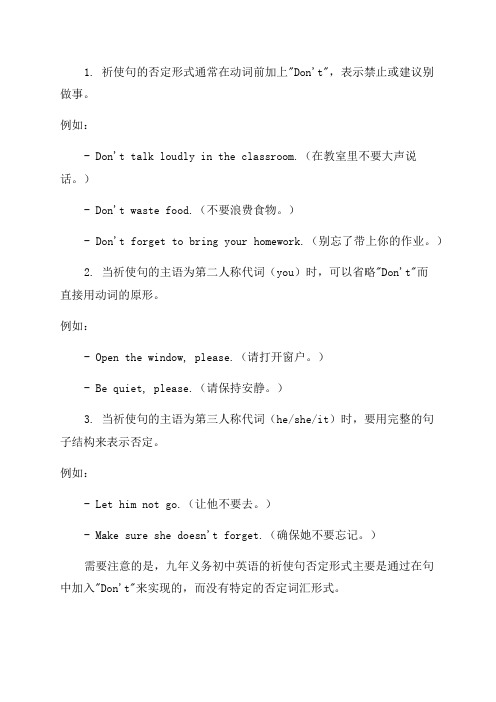
1. 祈使句的否定形式通常在动词前加上"Don't",表示禁止或建议别
做事。
例如:
- Don't talk loudly in the classroom.(在教室里不要大声说话。
)
- Don't waste food.(不要浪费食物。
)
- Don't forget to bring your homework.(别忘了带上你的作业。
)
2. 当祈使句的主语为第二人称代词(you)时,可以省略"Don't"而
直接用动词的原形。
例如:
- Open the window, please.(请打开窗户。
)
- Be quiet, please.(请保持安静。
)
3. 当祈使句的主语为第三人称代词(he/she/it)时,要用完整的句
子结构来表示否定。
例如:
- Let him not go.(让他不要去。
)
- Make sure she doesn't forget.(确保她不要忘记。
)
需要注意的是,九年义务初中英语的祈使句否定形式主要是通过在句
中加入"Don't"来实现的,而没有特定的否定词汇形式。
初中英语中必须掌握的八种否定形式

初中英语中必须掌握的八种否定形式一、完全否定英语中的完全否定可以用not, no, never, none, nobody, nothing, neither...nor, nowhere 等表示。
如:1.Nothing is difficult for him.没什么难得到他。
2.Mary never has beef.玛丽从来不吃牛肉。
3.Neither answer is correct.两种答案都不对。
二、部分否定英语中表示“全体〃意义的代词,形容词或副词。
如:all, both, altogether, always, completely, every day, everyone, everything, everywhere, every, everybody, many, often 等与not 搭配时,通常表示部分否定,意思是“并非都是〃“不完全是〃“不是每个都是〃等。
例如:1.Not everyone was amused by these April FooPs jokes.并不是每个人都觉得这些玩笑有趣。
2.Food likes and dislikes do not always seem related to nutrition. 对食物的好恶似乎并不总与营养有关。
比较:Nothing makes him happy.(全部否定)没有哪一件事情让他开心。
Not everything makes him happy.(部分否定)并不是每一件事都让他开心。
None of the students went to visit the science museum last week. (完全否定)上周没有一个学生去参观科技博物馆。
Not all of the students went to visit the science museum last week. (部分否定)上周并不是所有的学生都去参观了科技博物馆。
谈初中英语的几种特殊的否定句

l o s
t
k
n o
s
t
t
l飞 e
h
e
t t
r u
t t t
h
h
~
r
e
h
d ly k n
lm
o s
o
s
r u
.
句中有
7
.
a
t
a o s 时 将 lm
a 改为 h o e
d ly in
。
J
a e
k k
o
a
lw
a
ys
f in is f in i s h
h
e s
hi s
h m
w
o r
k
t ri
im
e
.
e
.
, 闷 卜
咖 司.
门.
闷,
咭
月.
. 润
, 卜
M
r
S m i t h w i ll b
a
e
h
s
e r e
w it
hi
n
t
e n
min
s
t
e s
.
W it h in
Th
e u
fe w d a y
n
t
e o
hey mpl
s a v e
d mo
t
t
he
a
Pe o p
a
l r e le i n j L d
.
.
. , , 。 司 卜冰 , 卜 归月,
召
.
eห้องสมุดไป่ตู้
e v e
t
e x
浅谈初中英语中的否定句

浅谈初中英语中的否定句[摘要]否定句在初中英语学习中,是一个重点,也是一大难点。
本文从四个方面对初中英语中的否定句做了简单的分类。
[关键词]农村学生初中英语否定句否定句在初中英语学习中是一个重点也是一大难点,对于没有语言交际环境的农村学生来说掌握起来并不容易,下面我就初中英语中的否定句做如下简单分类。
1.当句子中am/is/are/was/were;助动词,如will,have,do,did等;或情态动词,如must,can,may,could,would等后有not时句子为否定句。
如she isn’t a worker.她不是工人。
Jenny didn’t go to school yesterday.Jenny昨天没去上学。
Marry won’t have a rest till 3:00 at night.Marry没有休息直到晚上三点钟。
They can’t swim.他们不会游泳You mustm’t play football on the road.你千万不要在路上踢足球。
2.当句子中有none,nothing,nobody,never,nor,neither,no且无其他否定词时句子为否定句。
如None of them are teachers.他们都不是教师。
There is nothing/nobody in the room.房间里什么东西/人都没有I have never been to Japan.我从来没去过日本。
No pains,no gains.不劳则无获。
3.当句子中有few,little,hardly等词单独出现时句子相当于否定句。
There is little water in the bottle,is there?瓶子里没有多少水,是吗?He was careful ,and he made few mistakes in his homework.他仔细,所以作业里没有几个错误。
初中英语否定前缀

disadvantage (不利条件;缺点) honest (诚实的) — dishonest (adj.不诚实的) like (喜欢) — dislike (v.不喜欢)
appear (出现) — disappear (v.消失)
2.in-;ig-,il-,im-,ir-(in-在辅音n,l,m,p,r 前的变体)加在形容词、名词、副词上
logical(合逻辑的)-----illogical (不合逻辑的)
regular(规则的)-----irregular (不规则)
3. un-加在形容词、副词、名词及用于作 形容词的分词上
happy(高兴的) — unhappy (不高兴的) usual (通常的) — unusual (不 寻常的;罕见的) important (重要的) — unimportant (不重要的) friendly (友好的) — unfriendly (不友好的;不友善的)
healthy (健康的) — unhealthy (不健康的;不益于健康的)
able (能;会) — unable (无能 的;不会的)
fair (公平的;公正的) — unfair(不平的;不公正的)
fortunately (幸运地) — unfortunately (不幸运地)
4.non-加在名词、形容词、副词或作形容词的分 词上,表示“无,抗,防,非,不”之意
capable(有能力的)---Incapable (adj.不能的)
comparable(比较的)---incomparable(adj.无比的)
ability(可能性)----inability (n.不能)
im-常加在以字母m-, p-开头的形容词之 前。如:
中考初中英语八种否定句形式汇总
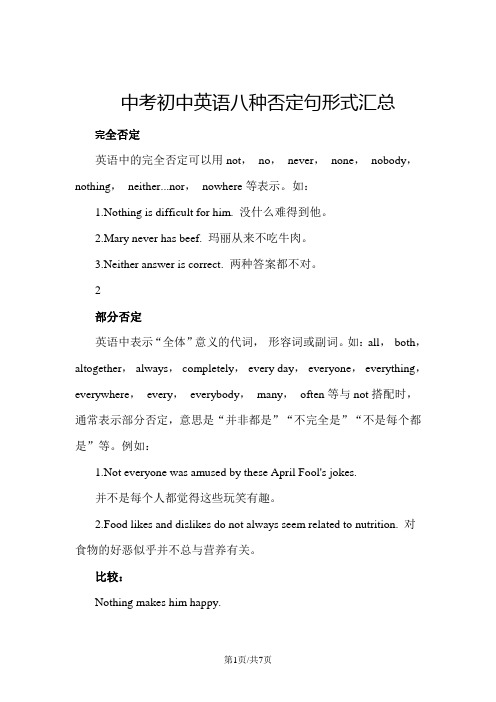
中考初中英语八种否定句形式汇总完全否定英语中的完全否定可以用not,no,never,none,nobody,nothing,neither...nor,nowhere等表示。
如:1.Nothing is difficult for him. 没什么难得到他。
2.Mary never has beef. 玛丽从来不吃牛肉。
3.Neither answer is correct. 两种答案都不对。
2部分否定英语中表示“全体”意义的代词,形容词或副词。
如:all,both,altogether,always,completely,every day,everyone,everything,everywhere,every,everybody,many,often等与not搭配时,通常表示部分否定,意思是“并非都是”“不完全是”“不是每个都是”等。
例如:1.Not everyone was amused by these April Fool's jokes.并不是每个人都觉得这些玩笑有趣。
2.Food likes and dislikes do not always seem related to nutrition. 对食物的好恶似乎并不总与营养有关。
比较:Nothing makes him happy.(全部否定)没有哪一件事情让他开心。
Not everything makes him happy.(部分否定)并不是每一件事都让他开心。
None of the students went to visit the science museum last week.(完全否定)上周没有一个学生去参观科技博物馆。
Not all of the students went to visit the science museum last week.(部分否定)上周并不是所有的学生都去参观了科技博物馆。
英语中必须掌握的八种否定形式
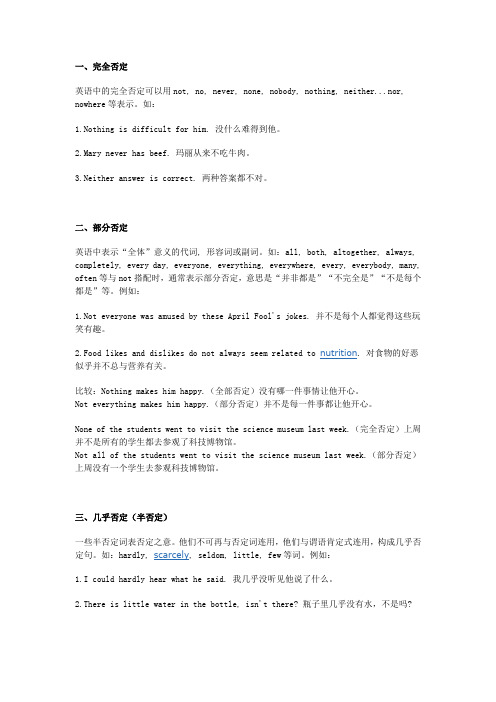
英语中的完全否定可以用not, no, never, none, nobody, nothing, neither...nor, nowhere等表示。
如:1.Nothing is difficult for him. 没什么难得到他。
2.Mary never has beef. 玛丽从来不吃牛肉。
3.Neither answer is correct. 两种答案都不对。
二、部分否定英语中表示“全体”意义的代词, 形容词或副词。
如:all, both, altogether, always, completely, every day, everyone, everything, everywhere, every, everybody, many, often等与not搭配时,通常表示部分否定,意思是“并非都是”“不完全是”“不是每个都是”等。
例如:1.Not everyone was amused by these April Fool's jokes. 并不是每个人都觉得这些玩笑有趣。
2.Food likes and dislikes do not always seem related to nutrition. 对食物的好恶似乎并不总与营养有关。
比较:Nothing makes him happy.(全部否定)没有哪一件事情让他开心。
Not everything makes him happy.(部分否定)并不是每一件事都让他开心。
None of the students went to visit the science museum last week.(完全否定)上周并不是所有的学生都去参观了科技博物馆。
Not all of the students went to visit the science museum last week.(部分否定)上周没有一个学生去参观科技博物馆。
初中英语知识归纳否定句的构成和转换的技巧

初中英语知识归纳否定句的构成和转换的技巧英语中,否定句在语法结构和用法上有着独特的特点。
掌握构成和转换否定句的技巧对于学生来说至关重要。
本文将归纳总结初中英语知识,探讨否定句的构成和转换方法。
一、否定句的构成1. 一般句式中的否定在一般句式中,我们可以使用否定副词或词组来构成否定句,常见的有not、never、no等。
例如:I am not going to the party.He never plays football.There is no pen on the desk.2. be动词的否定在be动词的句子中,我们可以在be动词后面直接加not来构成否定句。
例如:She is not happy.They are not in the park.3. 一般现在时的否定在一般现在时的句子中,我们需要在动词前面加do not或does not 来构成否定句。
例如:I do not like coffee.She does not watch TV in the morning.4. 一般过去时的否定在一般过去时的句子中,我们需要在动词前面加did not来构成否定句。
例如:They did not go to the cinema yesterday.He did not finish his homework.5. 助动词的否定在使用助动词的句子中,我们需要在助动词后面加not来构成否定句。
例如:She can not swim.He should not eat too much junk food.二、否定句的转换技巧1. 一般句式的转换在将一般句式转换为否定句时,我们可以简单地在谓语动词前面加上否定副词或词组。
例如:She likes app les. → She does not like apples.I go to school by bus. → I do not go to school by bus.2. be动词的转换在将be动词转换为否定句时,我们只需要在be动词后面加上not即可。
英语中的八种否定形式,你知道吗
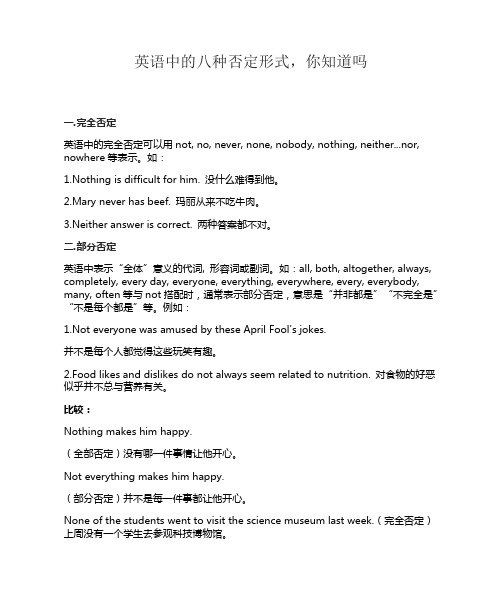
英语中的八种否定形式,你知道吗一.完全否定英语中的完全否定可以用not, no, never, none, nobody, nothing, neither...nor, nowhere等表示。
如:1.Nothing is difficult for him. 没什么难得到他。
2.Mary never has beef. 玛丽从来不吃牛肉。
3.Neither answer is correct. 两种答案都不对。
二.部分否定英语中表示“全体”意义的代词, 形容词或副词。
如:all, both, altogether, always, completely, every day, everyone, everything, everywhere, every, everybody, many, often等与not搭配时,通常表示部分否定,意思是“并非都是”“不完全是”“不是每个都是”等。
例如:1.Not everyone was amused by these April Fool's jokes.并不是每个人都觉得这些玩笑有趣。
2.Food likes and dislikes do not always seem related to nutrition. 对食物的好恶似乎并不总与营养有关。
比较:Nothing makes him happy.(全部否定)没有哪一件事情让他开心。
Not everything makes him happy.(部分否定)并不是每一件事都让他开心。
None of the students went to visit the science museum last week.(完全否定)上周没有一个学生去参观科技博物馆。
初中英语知识点归纳否定句的结构和否定词的用法
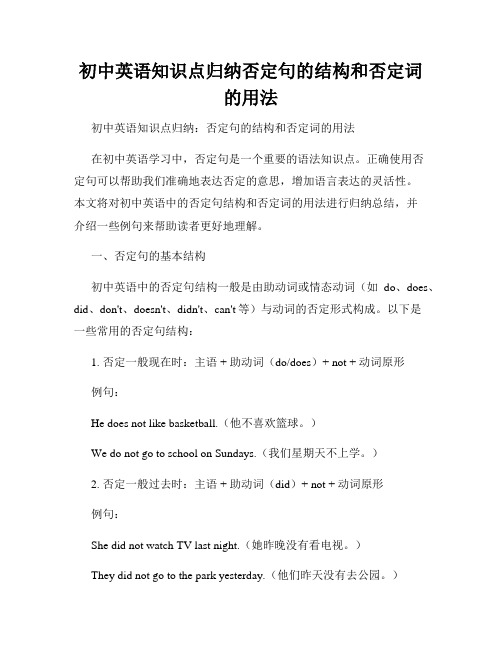
初中英语知识点归纳否定句的结构和否定词的用法初中英语知识点归纳:否定句的结构和否定词的用法在初中英语学习中,否定句是一个重要的语法知识点。
正确使用否定句可以帮助我们准确地表达否定的意思,增加语言表达的灵活性。
本文将对初中英语中的否定句结构和否定词的用法进行归纳总结,并介绍一些例句来帮助读者更好地理解。
一、否定句的基本结构初中英语中的否定句结构一般是由助动词或情态动词(如do、does、did、don't、doesn't、didn't、can't等)与动词的否定形式构成。
以下是一些常用的否定句结构:1. 否定一般现在时:主语 + 助动词(do/does)+ not + 动词原形例句:He does not like basketball.(他不喜欢篮球。
)We do not go to school on Sundays.(我们星期天不上学。
)2. 否定一般过去时:主语 + 助动词(did)+ not + 动词原形例句:She did not watch TV last night.(她昨晚没有看电视。
)They did not go to the park yesterday.(他们昨天没有去公园。
)3. 否定一般将来时:主语 + will not + 动词原形例句:I will not travel to Beijing next month.(我下个月不会去北京旅行。
)They will not come to the party tonight.(他们今晚不会来参加派对。
)4. 否定现在进行时:主语 + 助动词(am/is/are)+ not + 动词-ing 形式例句:I am not studying now.(我现在不在学习。
)They are not playing football in the park.(他们不在公园踢足球。
)5. 否定情态动词:主语 + 情态动词 + not + 动词原形例句:She can not swim.(她不会游泳。
初中英语否定句用法归纳
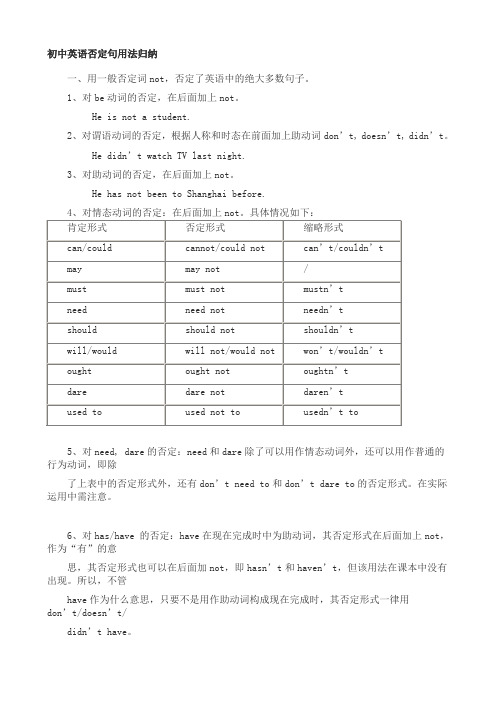
初中英语否定句用法归纳一、用一般否定词not,否定了英语中的绝大多数句子。
1、对be动词的否定,在后面加上not。
He is not a student.2、对谓语动词的否定,根据人称和时态在前面加上助动词don’t, doesn’t, didn’t。
He didn’t watch TV last night.3、对助动词的否定,在后面加上not。
He has not been to Shanghai before.5、对need, dare的否定:need和dare除了可以用作情态动词外,还可以用作普通的行为动词,即除了上表中的否定形式外,还有don’t need to和don’t dare to的否定形式。
在实际运用中需注意。
6、对has/have 的否定:have在现在完成时中为助动词,其否定形式在后面加上not,作为“有”的意思,其否定形式也可以在后面加not,即hasn’t和haven’t,但该用法在课本中没有出现。
所以,不管have作为什么意思,只要不是用作助动词构成现在完成时,其否定形式一律用don’t/doesn’t/didn’t have。
7、不定式的否定:在前面加上not。
即:ask / tell /…sb not to do sth。
8、动名词的否定:在前面加上not。
即:worry about not doing。
9、祈使句的否定:在句首加上Don’t。
如有please,在please后面加上don’t。
Please don’t talk in class.二、通过绝对否定词否定。
此类词如下:never, no, no one, nobody, nothing, nowhere, none, nei ther, neither…nor…, no more, no longer。
☆特别提醒:1、绝对否定词no相当于not…any…。
如no=not any, never=not ever, nothing=not anything, nowhere= not anywhere。
初中英语语法之-否定(各类动词以及句型的否定,附专项练习 参考答案)

否定专项练习1. We are too busy to take a long holiday this year, ________ the fact that we can't afford it.A) not to speak B) not to mention C) to say anything of D) much less2. He didn’t arrive ________ the game had begun.A) until B) after C) when D) before3. They could hardly keep themselves alive, ________ look after a wife and children.A) or not B) and even not C) let alone D) as opposed to4. He is ________ have done such a foolish thing.A) as experienced as to B) more experienced than toC) too experienced to D) only too experienced to5. All knowledge is ________ , and when it fails to lead the students into the correct path, it is either in itself bad, or it has been very imperfectly acquired.A) bad B) not well C) worse D) not good6. ________ other big cats, leopards are expert climbers.A) The most unlike B) They are unlike mostC) Unlike the most D) Unlike most7. We should ________ look down upon the people who are inferior to us.A) by no means B) by any means C) at all D) in any way8. It won’t be long ________ imperialism comes to its end.A) when B) after C) until D) before9. She can ________ be held responsible for the terrible accident.A) in any way B) in a wayC) in no way D) in the way10. You are not to let anyone know where we are going ________.A) under no circumstances B) under any circumstancesC) by every means D) at no time11. Miss Keller was so intelligent that I could not ________ .A) but admire her B) admire herC) admiring her D) to admire her12. The ministry had no alternative ________ our rates.A) except raising B) but raiseC) but to raise D) without raising13. I will not lose confidence in the great cause ________.A) at no time B) at timesC) at a time D) at any time14. No human beings could possibly copy down all these facts, ________ remember and organize them.A) much more B) much lessC) still more D) more than15. The students cannot be ________ careful in performing the experiment as it is such a critical link in the whole project.A) very B) tooC) quite D) so16. ________ to finish quickly.A) No every student wantsB) No every student wantC) Not every student wantsD) Not every student want17. The students are ________ with these two famous scientists in the lab.A) too pleased to workB) too pleased that they cannot workC) only too pleased to workD) so pleased that they cannot work18. He does not know English, ________ German or French.A) nothing to say about B) to say nothing ofC) anything to say about D) to say anything of19. It's nearly impossible to go through a major city ________ a person who is or appears to be homeless.A) not to have seen B) not to seeC) without seeing D) without being seen20. I've got ________ Sundays free this month.A) never B) notC) none D) no21. The book is ________ me, but I'll never give up studying.A) above B) overC) under D) below22. I don't believe it. I think he is ________ such a thing.A) the only person to do B) the first person to doC) the last person to do D) the very person to do23. The experiment is ________ ; it was a great success.A) far from being a failure B) far away from a failureC) more than a failure D) nothing but a failure24. You can't be ________ careful when driving on the highway.A) very B) quiteC) so D) too25. The old lady whom Jack quarreled with yesterday is ________ Mary.A) not other than B) none other thanC) nobody other than D) no one other than26. If we're attacked we can't but ________ in self-defense.A) to fight back B) fight backC) fighting back D) only to fight back27. I know nothing about his journey ________ he is to be away for a month.A) provided that B) supposing thatC) now that D) except that28. I have never been back since we moved out, not even to the town, ________ to the house where I was born.A) still less B) still notC) even not D) no to mention29. I ________ her skill of performance, though I don't like her personally.A) can't but admitting B) can't help but admittingC) can't help but to admit D) can't help but admit30. She is ________ diligent than he is.A) no B) notC) no more D) not more1-5 BACBD 6-10 DADCB 11-15 ACDBB 16-20 CCBCD 21-25 ACADB 26-30 BDADC。
浅谈初中英语中的几种否定形式

1 完 全 否定
文 献标 识 码 :C
文 章 编号 :6 2 1 7 (0 00 - 1 8 0 1 7 — 5 8 2 1 )6 0 2 - 2
例 如 : dn ttikh i asteea I o ’ hn ewl ps h xm。 我认 为 他 考 试 l
示 部分 否定 . 思是 “ 非 都 是 ‘ 完 全是 ‘ 是 每个 都 是 ” 。 意 并 不 不 等
例如 :
不管 他 多 么努 力 的 学 习 。 似 乎 永 远也 考 不 及格 。 他
6 运 用 某些 结构 表达 否 定 意义 61 o …t 太 …… 而不 能 . o o t
的从 句
对 食 物 的好 恶 似 乎并 不 总 与 营养 有 关 。
比较 : tig ma e i h p yf 部 否定 ) Nohn k s hm a p . 全
例 如 : )T e y u g m n i m r ba e ta i . f h o n a s oe rv h n w s 1 e 这 年轻 人 有 勇 尤谋 。
( N tee o ew sa ue ytee A r ol oe. 1 o vr n a m sd b hs pi Fo’ jk s ) y l S
并 不是 每 个人 都 觉 得 这些 玩 笑 有趣 。
()od l e n iie on ta asse e t o 2 o i sad dsksd o l y em rle t F k l w ad
r T ega td b orhl sm r ta a xrs. 2 h rtu ef yu ep i oe h nIcn epes ) i r
英语常用八种时态否定句谓语构成用法归纳总结
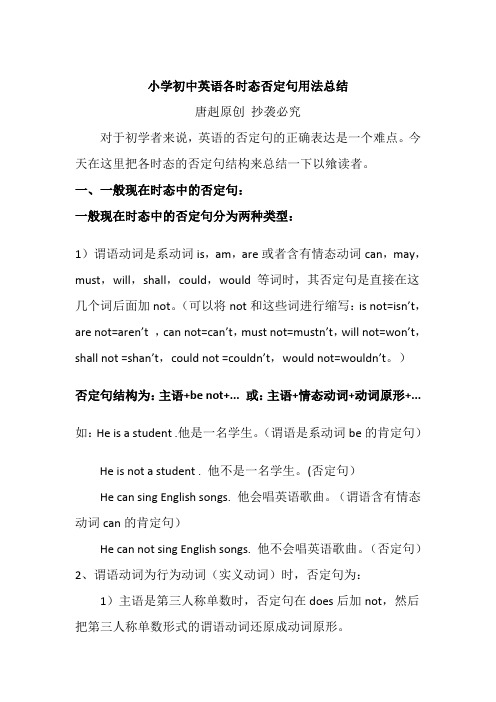
小学初中英语各时态否定句用法总结唐赳原创抄袭必究对于初学者来说,英语的否定句的正确表达是一个难点。
今天在这里把各时态的否定句结构来总结一下以飨读者。
一、一般现在时态中的否定句:一般现在时态中的否定句分为两种类型:1)谓语动词是系动词is,am,are或者含有情态动词can,may,must,will,shall,could,would 等词时,其否定句是直接在这几个词后面加not。
(可以将not和这些词进行缩写:is not=isn’t,are not=aren’t ,can not=can’t,must not=mustn’t,will not=won’t,shall not =shan’t,could not =couldn’t,would not=wouldn’t。
)否定句结构为:主语+be not+... 或:主语+情态动词+动词原形+... 如:He is a student .他是一名学生。
(谓语是系动词be的肯定句)He is not a student . 他不是一名学生。
(否定句)He can sing English songs. 他会唱英语歌曲。
(谓语含有情态动词can的肯定句)He can not sing English songs. 他不会唱英语歌曲。
(否定句)2、谓语动词为行为动词(实义动词)时,否定句为:1)主语是第三人称单数时,否定句在does后加not,然后把第三人称单数形式的谓语动词还原成动词原形。
如:He likes reading. 他喜欢阅读。
(谓语动词为行为动词like)He doesn’t like reading. (does not 可缩写为doesn’t,单三动词还原,去掉s)2)主语是非第三人称单数时,否定句在do后面加not,do not 可缩略为:don’t.如:We like reading. 我们喜欢阅读。
(谓语为行为动词like 的肯定句)We don’t like reading. 我们不喜欢阅读。
语法:初中英语中必须掌握的八种否定形式

语法:初中英语中必须掌握的八种否定形式never, none, nobody, nothing, neither、、、nor, nowhere等表示。
如:1、Nothing is difficult for him、没什么难得到他。
2、Mary never has beef、玛丽从来不吃牛肉。
3、Neither answer is correct、两种答案都不对。
2部分否定英语中表示“全体”意义的代词, 形容词或副词。
如:all, both, altogether, always, completely, every day, everyone, everything, everywhere, every, everybody, many, often等与not搭配时,通常表示部分否定,意思是“并非都是”“不完全是”“不是每个都是”等。
例如:1、Not everyone was amused by these April Foolsjokes、并不是每个人都觉得这些玩笑有趣。
2、Food likes and dislikes do not always seem related to nutrition、对食物的好恶似乎并不总与营养有关。
比较:Nothing makes him happy、(全部否定)没有哪一件事情让他开心。
Not everything makes him happy、(部分否定)并不是每一件事都让他开心。
None of the students went to visit the science museum last week、(完全否定)上周没有一个学生去参观科技博物馆。
Not all of the students went to visit the science museum last week、(部分否定)上周并不是所有的学生都去参观了科技博物馆。
3几乎否定(半否定)一些半否定词表否定之意。
初中英语知识点归纳被动语态的否定与疑问形式
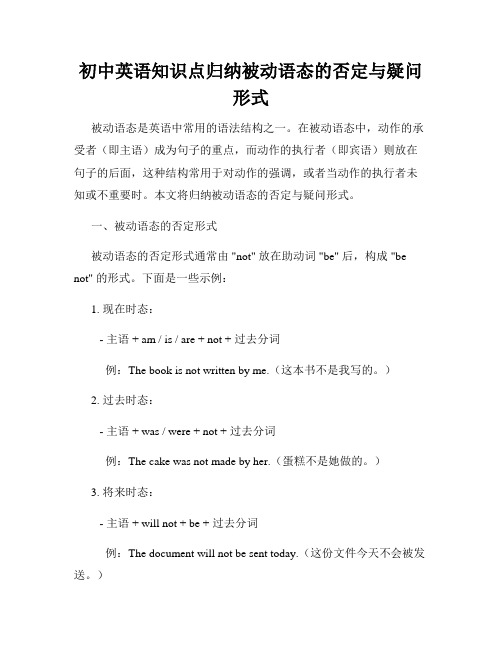
初中英语知识点归纳被动语态的否定与疑问形式被动语态是英语中常用的语法结构之一。
在被动语态中,动作的承受者(即主语)成为句子的重点,而动作的执行者(即宾语)则放在句子的后面,这种结构常用于对动作的强调,或者当动作的执行者未知或不重要时。
本文将归纳被动语态的否定与疑问形式。
一、被动语态的否定形式被动语态的否定形式通常由 "not" 放在助动词 "be" 后,构成 "be not" 的形式。
下面是一些示例:1. 现在时态:- 主语 + am / is / are + not + 过去分词例:The book is not written by me.(这本书不是我写的。
)2. 过去时态:- 主语 + was / were + not + 过去分词例:The cake was not made by her.(蛋糕不是她做的。
)3. 将来时态:- 主语 + will not + be + 过去分词例:The document will not be sent today.(这份文件今天不会被发送。
)4. 现在完成时态:- 主语 + has / have + not + been + 过去分词例:The message has not been received yet.(这条消息还没有被接收到。
)需要注意的是,在被动语态的否定形式中,助动词 "be" 的形式和谓语动词的过去分词形式会根据句子的时态和主语的单复数形式而变化。
二、被动语态的疑问形式被动语态的疑问形式通常将助动词 "be" 移至句子的主语前,构成"be" 的疑问形式。
下面是一些示例:1. 现在时态:- Be + 主语 + 过去分词 + 其他副词例:Is the letter written by you?(这封信是你写的吗?)2. 过去时态:- Was / Were + 主语 + 过去分词 + 其他副词例:Were the keys found by them?(这些钥匙是他们找到的吗?)3. 将来时态:- Will + be + 主语 + 过去分词 + 其他副词例:Will the project be completed on time?(这个项目会按时完成吗?)4. 现在完成时态:- Has / Have + 主语 + been + 过去分词 + 其他副词例:Has the work been finished yet?(这项工作已经完成了吗?)疑问形式中的助动词 "be" 的形式也需根据句子时态和主语的单复数形式进行调整。
初中英语形容词否定前后缀语法归纳
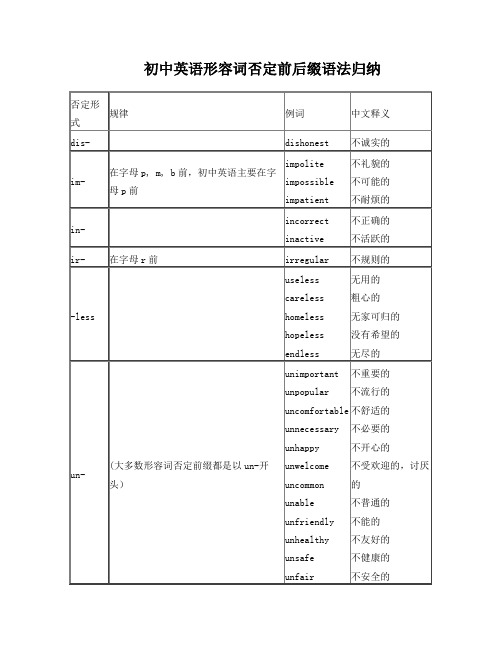
◇以un-开头的形容词其前面的冠词用的是an。例如:an unusual boy。
◇dis-否定前缀除了形容词dishonest外,还常常用在动词前构成否定形式,如dislike, disagree, disappear等。
unable
unfriendly
unhealthy
unsafe
unfair
unusual
…
不重要的
不流行的
不舒适的
不必要的
不开心的
不受欢迎的,讨厌的
不普通的
不能的
不友好的
不健康的
不安全的
不公平的
不同寻常的
☆特别提醒:
◇初中阶段,形容词否定前缀大多以un-构成,除去少数几个以-less否定后缀结尾外,不是以un-否定前缀构成的形容词基本上只有7个。
初中英语形容词否定前后缀语法归纳
否定形式
规律
例词
中文释义
dis-
dishonest
不诚实的
im-
在字母p, m, b前,初中英语主要在字母p前
impolite
impossible
impatient
不礼貌的
不可能的
不耐烦的
in-
incorrect
inactive
不正确的
不活跃的
ir-
在字母r前
irregular
不规则的
-less
useless
careless
homeless
hopeless
endless
无用的
五个常见英语否定前缀用法辨析
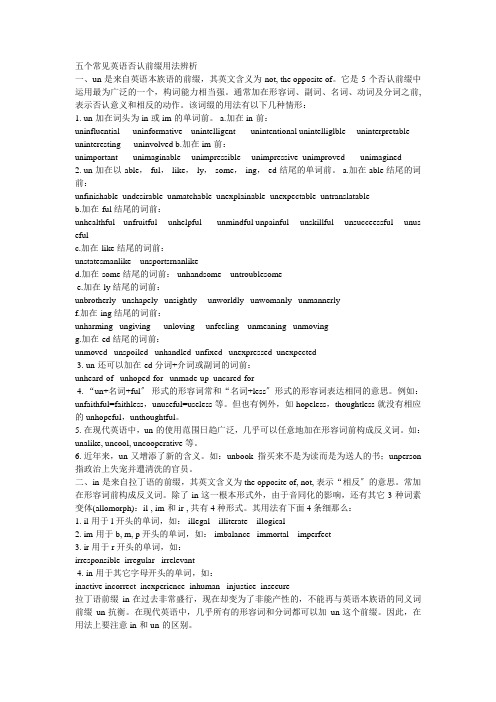
五个常见英语否认前缀用法辨析一、un-是来自英语本族语的前缀,其英文含义为not, the opposite of。
它是5个否认前缀中运用最为广泛的一个,构词能力相当强。
通常加在形容词、副词、名词、动词及分词之前,表示否认意义和相反的动作。
该词缀的用法有以下几种情形:1. un-加在词头为in-或im-的单词前。
a.加在in-前:uninfluential uninformative unintelligent unintentional unintelliglble uninterpretable uninteresting uninvolved b.加在im-前:unimportant unimaginable unimpressible unimpressive unimproved unimagined2. un-加在以-able,-ful,-like,-ly,-some,-ing,-ed结尾的单词前。
a.加在-able结尾的词前:unfinishable undesirable unmatchable unexplainable unexpectable untranslatableb.加在-ful结尾的词前:unhealthful unfruitful unhelpful unmindful unpainful unskillful unsucceessful unus efulc.加在-like结尾的词前:unstatesmanlike unsportsrnanliked.加在-some结尾的词前: unhandsome untroublesomee.加在-ly结尾的词前:unbrotherly unshapely unsightly unworldly unwomanly unmannerlyf.加在-ing结尾的词前:unharming ungiving unloving unfeeling unmeaning unmovingg.加在-ed结尾的词前:unmoved unspoiled unhandled unfixed unexpressed unexpected3. un-还可以加在-ed分词+介词或副词的词前:unheard-of unhoped-for unmade-up uncared-for4. “un+名词+ful〞形式的形容词常和“名词+less〞形式的形容词表达相同的意思。
- 1、下载文档前请自行甄别文档内容的完整性,平台不提供额外的编辑、内容补充、找答案等附加服务。
- 2、"仅部分预览"的文档,不可在线预览部分如存在完整性等问题,可反馈申请退款(可完整预览的文档不适用该条件!)。
- 3、如文档侵犯您的权益,请联系客服反馈,我们会尽快为您处理(人工客服工作时间:9:00-18:30)。
外教一对一
初中英语中的几种否定
1 .完全否定
英语中的完全否定可以用not、no、never、none、nobody、nothing、neither...nor、nowhere等表示。
例如:
1.Nothing is difficult for him.没什么难得到他。
2.Mary never has beef.玛丽从来不吃牛肉。
3.Neither answer is correct.两种答案都不对。
2. 部分否定
英语中表示“全体”意义的代词、形容词或副词。
如:all、both、altogether、always、completely、every day、everyone、everything、everywhere、every、everybody、many、often等与not搭配时,通常表示部分否定,意思是“并非都是”“不完全是”“不是每个都是”等。
例如:
1.Not everyone was am used by these April Fool’s jokes.
并不是每个人都觉得这些玩笑有趣。
2.Food likes and dislikes do not always seem related to nutrition.
对食物的好恶似乎并不总与营养有关。
比较:
Nothing makes him happy.(全部否定)
没有哪一件事情让他开心。
Not everything makes him happy. (部分否定)
并不是每一件事都让他开心。
None of the students went to visit the science museum last week.(完全否定)
上周没有一个学生去参观科技博物馆。
外教一对一
Not all of the students went to visit the science museum last week.(部分否定)
上周并不是所有的学生都去参观了科技博物馆。
3 .几乎否定(半否定)
一些半否定词表否定之意。
他们不可再与否定词连用,他们与谓语肯定式连用,构成几乎否定句。
如:hardly scarcely seldom little few等词。
例如:
1.I could hardly hear what he said .我几乎没听见他说了什么。
2.There is little water in the bottle,isn’t there? 瓶子里几乎没有水,不是吗?
4. 双重否定
双重否定句由not + 具有否定意义的词构成,形成“否定+否定=肯定”的语言效果。
双重否定可以表示强调,也可以表示委婉的含义。
例如:
1.Her name can’t escape me forever. 我永远忘不了她的名字。
2.The songs never fail to make the children smile.这些歌曲一向都能使孩子微笑。
5. 转移否定
转移否定,即句中的否定虽然出现在谓语部分,否定范围却不在主句谓语动词本身,而转移到了句子中的宾语、状语或其他成分上。
这种形式在初中比较常见的有以下两种情况:
a.转移否定多用于表思维活动
如:believe(相信)expect(期望)hope(希望)imagine(想象)think(认为)等。
例如:
I don’t think he will pass the exam。
我认为他考试会不及格的。
b.主句的谓语动词是表感觉的系动词,通常也用于转移否定句
这类动词有:seem(好像)feel(感觉)appear(出现)look like (看起来像)等。
例如:
外教一对一 1.It doesn’t look like it’s going to rain.=It looks like it isn’t going to rain.
好象不会下雨。
2.No matter how hard he studies,he never seems to be able to pass the exam.
不管他多么努力的学习,他似乎永远也考不及格。
6. 运用某些结构表达否定意义
too---to 太--------而不能
more A than B(与其B不如A)或more than +含有can的从句
prefer to do sth rather than do sth
宁愿(喜欢)---而不愿---
例如:
1.He is too tired to walk.
他太累了,走不动了。
2.The young man is more brave than wise.
这年轻人有勇无谋。
3.He prefers to write his letters rather than dictate them.
他喜欢自己写信而不愿口授自己的信。
7.运用含否定意义的词或词组表否定意义
a.动词短语表否定意义
如:
differ from( 与----=不同)
prefer --- to --- (喜欢-----而不喜欢------)
keep/prevent/stop/protect ---from( 阻止,使-----不)
外教一对一 keep off (不接近,不让------接近)
lose sight of (看不见)等。
例如:
1.The Great Green Wall stops the sand from moving to the rich land in the south.
绿色长城阻止了风沙吹向南方肥沃的田地。
2.Sally prefers singing to dancing.
莎丽喜欢唱歌而不喜欢跳舞。
b.动词表否定意义
如,absent (缺席) fail(不及格) refuse(拒绝) miss(未赶上 ,错过) escape(被-----忘掉) 等
例如:
1. Why did you absent yourself from school yesterday?
昨天你为什么不来上学?
2. He missed the 9:30 train and therefore missed the accident.
他没赶上9:30的那班火车,也因此而逃过那次车祸.
c.介词表否定意义:
without(无,没有)against(反对)beyond(超出,无法) except/but(除---外)past(超过)off(离开)above(超出---之外)等
例如:
1. I can’t finish the work without your help.
没有你的帮助,我完不成这工作。
2.His conduct has always been above suspicion.
他的行为一直无可置疑。
3. His stupidity is past all belief.
外教一对一 他的愚蠢简直不可思义。
8. 运用连词before unless等引导的状语表否定意义
例如:
1. WangWei went to bed before he finished his homework.
王伟没完成作业就睡觉了。
2. Unless you put on your overco at ,you’ll catch a cold.
如果你不穿大衣,你就会感冒。
